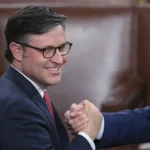Donald Trump’s first criminal trial has been filled with salacious testimony, but a well-known financial reporter who has been covering the former president for years said on Saturday that one thing in particular simply didn’t add up.
New York Times reporter Susanne Craig, who is known for following the finances of Trump and his business empire, appeared on MSNBC over the weekend to talk about Trump and his current trial. In that case in Manhattan, the ex-president is accused with more than 30 felonies in connection with an alleged scheme to impact the 2016 election by covering up hush money payments to adult film star Stormy Daniels.
The host asked Craig about testimony that could potentially “humanize” Trump, including an anecdote that Trump’s longtime aide, Hope Hicks, shared on Friday. She said under oath that Trump asked that the newspaper not be delivered after news broke of his alleged affairs, potentially bolstering Trump’s defense that he wasn’t trying to affect the election with the purported payments meant to silence Daniels.
“I am curious how Donald Trump handled himself in court listening to this formerly close aide, someone described as being like a daughter to him. Did she manage to humanize him to the jury, particularly when she said the part like, he did not want the newspapers to be delivered to the home, to the residence for fear that Melania would see them and get upset. “
Craig said that comment was “interesting because you imagine Melania in this tower with no other information, so we won’t drop off the newspapers.”
“That did not add up to me,” she said of the comment, which could be seen as one of the few hints Trump was thinking about Melania’s reaction as opposed to the general election.
On Trump’s behavior while Hicks made her comments, Craig said that, for the most part, “he’s sitting there and he has his eyes closed.” She said he didn’t even react much when Hicks burst into tears on the stand.
“He is trying not to have any reaction to what is going on in the courtroom,” she explained. “Occasionally he will pay attention and be watching a witness. For the most part, we are not seeing that. I’m interested in how that is playing with the jury. They are watching him and seeing that. I can’t imagine that is helping him.”










